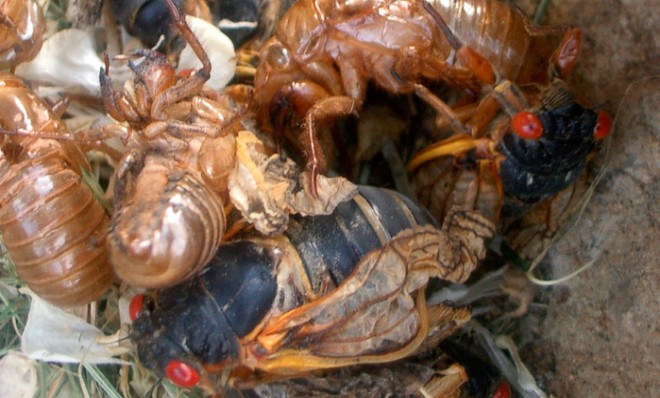America's coming cicada invasion: 5 key facts
The eastern United States is about to be overtaken by hundreds of millions of fearsome-looking bugs

A free daily email with the biggest news stories of the day – and the best features from TheWeek.com
You are now subscribed
Your newsletter sign-up was successful
They're back! After 17 years of hiding in the earth, vast clouds of cicadas are set to swarm the eastern United States in the coming weeks, from Georgia all the way up to New York. The noisy insects — a menacing black with fiery red eyes — are expected to be everywhere and on everything, buzzing through the air and clinging to the sides of buildings. But despite their terrifying appearance, the bugs are relatively harmless. Here, five facts worth knowing about the coming swarm of Brood II Magicicadas:
1. There will be hundreds of millions of them
The insects aren't very big — adults tend to be a little larger than a quarter. And while they don't sting or bite, there will be hundreds of millions — perhaps billions — of them. A single Brood II female lays as many as 600 eggs before she dies. According to Magicicada.org, a website run by John Cooley, a research scientist at the University of Connecticut, Brood II cicadas tend to form denser clouds than other varieties: Clusters can range from tens of thousands to 1.5 million per acre.
The Week
Escape your echo chamber. Get the facts behind the news, plus analysis from multiple perspectives.

Sign up for The Week's Free Newsletters
From our morning news briefing to a weekly Good News Newsletter, get the best of The Week delivered directly to your inbox.
From our morning news briefing to a weekly Good News Newsletter, get the best of The Week delivered directly to your inbox.
2. They won't be around for very long
When soil temperatures reach a balmy 64 degrees in late May or June, nymphs will start emerging from underground, "boiling out of the ground" as if "from some horror movie," reports the New York Times. Then, for the first time since 1996, they'll climb up trees, shed their skin, and transform into loud, obnoxious adults looking to procreate. Thankfully, the whole cycle lasts only 6 weeks, and we won't see the cicadas again until 2030.
3. They're actually great for plant life
When a female squirts her eggs on twigs and shrubs, they form thick clusters that strip trees of excess branches. "This does little permanent damage to trees; some small branches may be broken," notes The Times. "But the end result is often the same as that from pruning — healthier plants."
A free daily email with the biggest news stories of the day – and the best features from TheWeek.com
4. They don't taste bad
Cicadas are arthropods, meaning they're related to shrimp and lobsters. (Something to bear in mind if you have shellfish allergies.) According to TIME, the bugs have something of a long culinary history, especially in the Southwest:
Ashlee Horne of Nashville likes her cicadas sautéed in butter and garlic. Jenna Jadin of Washington, D.C., bakes them into banana bread, chocolate-chip cookies, and rhubarb pie. Others like them dipped in chocolate for a sweet, crunchy snack. [TIME]
According to one blogger, they taste "crispy and crunchy, with a nutty, almond-like flavor," and are best eaten before the nymphs form their hard exoskeleton. The New York Times says a cicada swarm once even rescued the Onondaga Indians of New York from famine.
However, the Humane Society warns against letting dogs and other pets gorge on yards full of the bugs, as their hard exteriors could present a choking hazard. An ingredient found naturally in their shells (chitin) can also cause constipation and vomiting when digested in large amounts.
5. Bob Dylan wrote a song about them
It's called "Day of the Locust." The inspiration reportedly came in 1970, during an especially loud, sleepless night of buzzing in Princeton, N.J. It may be the best song ever written about noisy insects:
-
 Health insurance: Premiums soar as ACA subsidies end
Health insurance: Premiums soar as ACA subsidies endFeature 1.4 million people have dropped coverage
-
 Anthropic: AI triggers the ‘SaaSpocalypse’
Anthropic: AI triggers the ‘SaaSpocalypse’Feature A grim reaper for software services?
-
 NIH director Bhattacharya tapped as acting CDC head
NIH director Bhattacharya tapped as acting CDC headSpeed Read Jay Bhattacharya, a critic of the CDC’s Covid-19 response, will now lead the Centers for Disease Control and Prevention